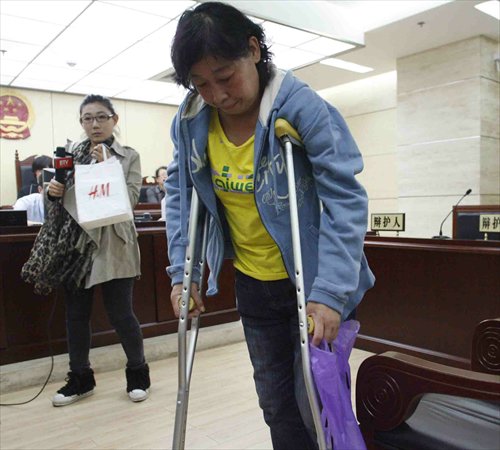HOME >> CHINA
Mental violence
Source:Xinhua Published: 2015-12-22 20:08:01
New anti-abuse law draft covers emotional damage, cohabiting couples

Beijing's Xicheng district court sentences Luo Li (right) to two and a half years in prison for robbing a taxi driver on September 28, 2011. Luo, 44, said that she wanted to go to prison as there was nowhere else she could go to escape domestic violence. Photo: CFP
China's first domestic violence law may criminalize emotional and psychological abuse and cover cohabiting couples in order to protect traditionally silent abuse victims, the new draft of the law reads.
The draft, which is up for a second reading at the National People's Congress (NPC) Standing Committee's bimonthly session, states that "[China] prohibits any form of domestic violence."
Domestic violence is defined as physical or psychological harm inflicted by relatives, including assault, injury, restraint or forcible limits on physical liberty as well as recurring verbal threats and abuse.
An earlier draft, submitted in August this year, included only physical abuse, but many lawmakers argued that this definition was too narrow, said Su Zelin, deputy director with the Commission for Legislative Affairs of the NPC Standing Committee.
They also said that the law should cover cohabiting couples, Su said, hence, the second draft covers those who are not related but live together.
China does not yet have a specialized law on domestic abuse, and the issue has remained in the shadows as family conflict is widely considered an embarrassing private matter in China. As a result, victims are often afraid to speak out and, in many cases, are turned away by police.
Attitudes to domestic violence shifted in 2011, when Kim Lee, wife of celebrity entrepreneur Li Yang, posted pictures of her bruised face on Sina Weibo and accused Li of assault. In 2013, Kim was granted a divorce, alimony and compensation on the grounds of domestic violence.
According to the All-China Women's Federation, nearly 25 percent of Chinese women have suffered violence in their marriage, but the federation receives only 40,000 to 50,000 complaints each year.
Victims who approach the federation for help are mainly women, children and the elderly, and 88.3 percent of cases in 2014 involved abuse by husbands of their wives, 7.5 percent by parents or a parent, and 1.3 percent by children.
Personal protection
According to the draft, victims and those in immediate danger can file for a personal protection order that the court must grant or deny within 72 hours. In urgent cases, decisions must be made the same day.
Police, women's federations and social service organs, in addition to close relatives, can apply for orders for those with none or limited civil capacity or those who cannot do so themselves as a result of physical force or threats.
Once the order is granted, courts can prohibit the abuser from harassing, stalking or contacting the applicant; order the abuser to leave a shared home; or adopt various other measures to protect the applicant.
Should the abuser violate the protection order, they may be fined up to 1,000 yuan ($154), detained for up to 15 days or face criminal charges.
The draft also sets out to enhance protection for particularly vulnerable groups: Minors, the elderly, disabled people, pregnant or breast-feeding women and the critically ill will all be entitled to special attention.
Police must notify civil affairs departments should they find that those with none or limited civil capacity have been harmed, or are under threat and are unattended, and escort them to temporary shelters, support services or welfare centers, the draft reads.
It also requires social workers, doctors and teachers to report suspected abuse. Should they fail to do so, they will be held liable in cases with serious consequences together with those in charge of the institutions concerned and their superior organs. Police should protect the privacy of whistle-blowers.
Room for improvement
Lawmakers acknowledged that the new draft of the law is a significant step forward from the previous version, but they want more.
In a panel discussion over the draft law held on Monday afternoon, at least five legislators voiced concerns over the lack of any explicit reference to "sexual violence" in the new draft.
"Sexual abuse has become a prominent social problem [and] constitutes a great proportion of domestic violence, and it should be included in the new law," said legislator Zhang Ping.
He added that the law should also cover "economic control."
"It is not entirely unheard of that people, in many cases women and elders, are stripped of personal freedom as a result of economic disparity between family members," Zhang said.
His words were echoed by lawmaker Dong Zhongyuan, who argued that the definition of domestic violence was still too abstract, and failed to communicate what constitutes abuse.
Xu Qian, deputy head of the NPC provincial committee of Fujian Province, meanwhile, said the law should be extended to apply to ex-spouses too.
Posted in: Society